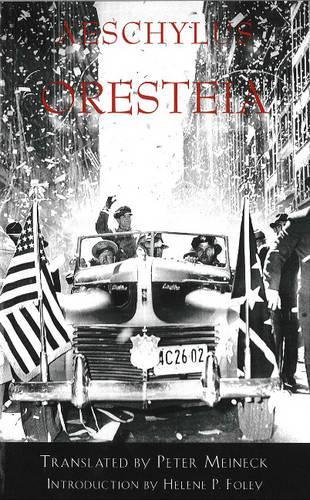
Oresteia
(Paperback)
Available Formats
Publishing Details
Oresteia
By (Author) Aeschylus
Translated by Peter Meineck
Introduction by Helene P. Foley
Hackett Publishing Co, Inc
Hackett Publishing Co, Inc
15th September 1998
United States
Classifications
General
Non Fiction
882.01
Physical Properties
Paperback
224
Width 136mm, Height 215mm
199g
Description
Aeschylus, the earliest of the great Attic tragedians, presented his Oresteia at Athens' City Dionysia festival in 458 BCE. Born in the last quarter of the sixth century, Aeschylus had fought with the victorious Greeks in one and probably both of the Persian Wars (190 and 480-79). He died around 456 at about seventy years of age in Gela, Sicily. His epitaph records his role as a soldier at Marathon, not his artistic achievements, but these were many. The author of more than seventy plays, he won his first of thirteen tragic victories in 484. Of these plays, only seven remain. The Oresteia is Aeschylus' only complete surviving trilogy; the satyr play with which it was first performed, Proteus, is lost. Peter Meineck has aimed to translate the Oresteia for the modern stage.
Reviews
Peter Meineck's new rendition of the Oresteia is that rare and wonderful thing: a text accessible to the Greekless audience while still preserving the vocabulary of Aeschylus. Those of us who have seen Peter Meineck's performances have long marveled at his ability to turn Greek into clear English, how he does not do 'versions' of the plays, how he does not rewrite the ancients into modern jargon (even his comedies maintain more Aristophanic text than is usual). Here lines that students have always needed explicated stand clear. . . . Helene Foley has provided a fine introduction for this translation. Introduction and translation together provide an exciting text, one that should be widely read, widely used. --Karelisa Hartigan, University of Florida, in The Classical Outlook
. . . a translation for the stage by an experienced man of the theater. Its virtues are very real, and, though Meineck makes them seem easy, very hard to achieve. The idiom is contemporary without yielding to the siren song of gimmicky updating; it manages to be clear without betraying Aeschylus' complexity or sacrificing his intricate imagery. What makes it effective on stage makes it work on the page, too. With the added guidance of Helene Foley's characteristically intelligent Introduction and Meineck's own crisp annotation and full stage directions, this translation offers the most approachable and in many ways most communicative Oresteia now available. It will be the Oresteia of choice for many teachers and their students, as well as for readers interested in what makes Greek tragedy great theater. --Peter Burian, Duke University
Meineck's translation is faithful and supple; the language employed is modern without betraying the grandeur and complexity--particularly the images--of the Aeschylean text. After reading this translation, one has but one further wish: to see it and hear it at Delphi, Epidaurus or Syracuse. --Herman Van Looy, L'Antiquite Classique
Author Bio
Aeschylus; Translated by Peter Meineck
